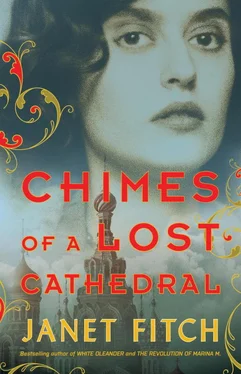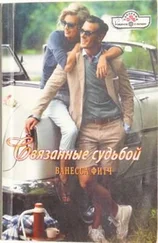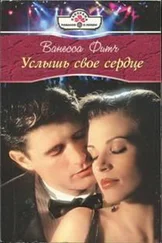Lenin? I doubted it, but just to be sure, I hurried along with the others, jouncing as fast as my swollen body would allow.
A woman called over her shoulder to a tiny boy standing in the middle of the road, his finger in his mouth. “ Davai, Fedya!”
The station swarmed with people, more people than I’d ever seen in this town. And here was the reason. A great train steamed at the platform on red-painted wheels—a train the likes of which had never been seen in this dusty backwater or anywhere else. Boldly painted, car after car, with modern constructivist designs—strong silhouettes of arched-necked horses bearing cavalrymen, figures in black and white facing off red obtuse triangles and black circles. It bore the lettering, LITERARY-INSTRUCTIONAL TRAIN RED OCTOBER.
The last time I’d seen anything like it was in Palace Square on the first anniversary of the revolution—the same bold ardor, the same visionary energy. Now it had come to us. For the first time in months, I felt awake. Futurist designs blazoned every car. What a spectacle! Abstracted armies, bold Red soldiers with machine guns, workers with banners, or were they flames? Factories with smokestacks that might be cannons. The Guest from the Future had arrived, shaking our falling-apart town to life. Children raced around like gulls, clamored to be lifted up. The revolution had come to Tikhvin.
Ever more people crowded onto the platform to see the magical beast. They pushed and pulled like the sea. How had I forgotten this, the power, the vision, the possibilities of our time? Those endless dull meetings at the Women’s Club, the days sweeping out our tiny flat, cooking, cleaning. The revolution was not about the four categories of housework! This was the revolution—iron and thunder, the Future.
The doors flew open, and people in white blouses spilled out of the cars wearing thick belts like acrobats, men and women too. A man in a leather jacket stalked up and down the platform before the cars, examining our faces as if memorizing us. Soldiers sat on the rooftops of every car, their legs dangling, joking, calling down to the crowd. A man in a white blouse began walking on his hands. I wondered if someone would begin to juggle or eat fire. It was a circus—a Literary-Instructional circus on wheels. Exactly what Lunacharsky had meant when he talked about the Revolutionary Carnival. This elation, this moment of glorious non-Styopa! For a brief instant, I was free from guilt and expectations, that possessive arm, his eternal fish and plans for our matrimonial future.
I spotted Liza in the crowd of schoolgirls and boys, chattering excitedly, reading the slogans, admiring the figures on the sides of the cars—no way the widow could blame me for this. It struck me—these murals were the Soviet equivalent of the iconostasis. Instead of Christos, the oversized figure was a worker with his banner. The gathering forces representing the eternal fight between good and evil being conducted right now, raging between the Volga and the Urals.
A soldier with an accordion on the roof of a car struck up “Dubinushka,” Little Hammer, the old work song, and everybody knew the words: Ekh, dubinushka, ukh-nem! Ekh, zelyonaya sama poidyot. I joined in too—why not? I never felt myself more than simply a sojourner here, but as the strength of our voices grew, I felt proud to be among these people—citizens of Tikhvin. Russian citizens. Soviet people. We sang out to prove something to those soldiers on the carriage roofs. We too were the revolution. I even caught some of the railwaymen singing, despite how they felt about the Bolsheviks and their opposition to labor unions. I could imagine Styopa somewhere, singing under his breath. He too knew the feel of a hammer in his hand. The accident that kills the worker in the song, he had personally felt that blow.
The soldier on the roof didn’t waste any time but launched right into the next tune, “The Cliff on the Volga,” then some soldiers’ songs: “Ogonyok” and “Wait for Your Soldier.” And a new one most didn’t know, though the soldiers on the train and the soldiers in the crowd taught it to us:
Again they prepare for us the tsar’s throne.
But from the taiga to the British seas
The Red Army is strongest of all.
We were hungry for inspiration, as much as for bread. I realized that we had all unconsciously accepted the inevitability of Kolchak’s arrival. Despite the best efforts of Pravda and the Tikhvin Soviet, we’d been steeling ourselves for defeat. This train was performing a miracle—breathing purpose back into our lungs.
Down the platform, a painted canvas bearing the slogan EVERYTHING FOR THE FRONT! and SOVIET PEOPLE’S THEATER rolled up, revealing a boxcar converted to a simple stage. We moved down the platform. I stood on tiptoe to see the play unfold. In swaggered Admiral Kolchak, in his customary white uniform covered with a fat tricolored ribbon, a medal as big as an ash can lid, and gold epaulettes a foot long, a bottle of champagne tucked under one arm. He was followed by three fat men in dress jackets and top hats. Each hat bore a flag—France, England, the United States. A fat priest with a long beard swung a censer as the Entente pulled money out of bags and crammed it in handfuls down Kolchak’s coat and into his cap as fast as they could.
“That’s right,” the man next to me said. “He’d fall apart in two seconds without the English.”
“Down with Kolchak!” people shouted.
Kolchak mounted a tall-backed chair, transformed into a throne. The Entente and his own generals were about to invest him with a tsar’s crown and ermine.
“The Supreme Ruler of all the Russias,” the assembled actors called out, and began to lower the crown amid the crowd’s boos and hisses, when a group of Red Army soldiers burst in.
“Urah!” the crowd shouted. The old man next to me on his toes, yelling in my ear.
The Entente stole away, leaving Kolchak and his White officers to battle the Red Army—identified by their familiar pointed felt caps with the red star, their bayonets fixed.
“Get them!” the schoolboys called out. “Kill them! Get the Whites!”
As the Red Army men advanced, Kolchak and his generals scrambled away, until, at the decisive moment, Kolchak slipped and fell on the scattered money, and knocked himself out on the floor. Great howls of laughter from the crowd. The generals went running, one of them smart enough to bend over and retrieve the champagne.
The few remaining White officers, also marked by giant epaulettes, attempted to protect their leader, but our Red soldiers easily overpowered them and ran them through. Finally, the Red Army men stood center stage, one with a foot planted on the pile of dead Whites, and broke into “The Red Army Is Strongest of All,” and now we knew the words. I wondered if Korsakova was here, if she could see Liza singing along. A different world’s being born, Raisa Filipovna. Her daughter would be part of it, and my son as well.
And then I saw him again, the boy in my dream, the brave little boy with whom I had run in the streets of Petrograd in the rain, hand in hand. His sensitive spirit, his courage. I felt him take my hand. There might be a future, for me, for him. And where was my courage, where had it vanished to?
The next agit-play illustrated the dangers of speculation and hoarding grain. Aptly chosen, as the town was a real hub for it. The set quickly converted into a factory, a few boxes and uprights nailed together, an old wheel, a shelf out of a wide board. Actors hammered on the bottom of a washtub and a big can to symbolize metalwork. Our brave workers in the city, weak with hunger. One hungry worker collapsed at the bench, while the others gathered around, pulled him up again.
Читать дальше












